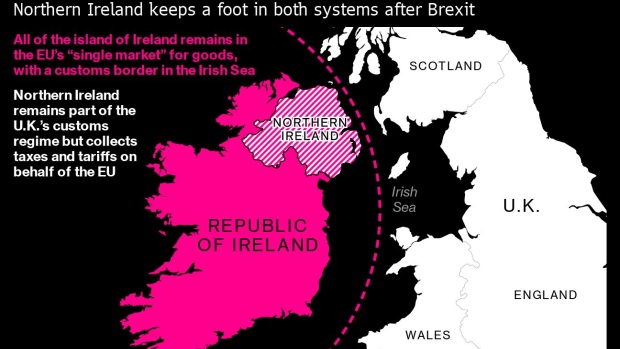Jan 12, 2022
Eyes on Downing Street, Liz Truss Faces a Fraught Brexit Choice
, Bloomberg News

(Bloomberg) -- U.K. Foreign Secretary Liz Truss enters the latest round of post-Brexit negotiations over Northern Ireland, facing a choice between picking a fight with the European Union that would curry favor with her Conservative Party faithful or cutting a deal to avert a trade war.
Truss, who took responsibility for the talks following the resignation of former Brexit chief David Frost in December, will meet European Commission Vice President Maros Sefcovic at the foreign secretary’s country residence, Chevening House, on Thursday, according to a government statement. It is their first face-to-face meeting, and talks will go on into Friday.
The Northern Ireland dilemma is a politically fraught inheritance for Truss, who has positioned herself as a potential successor to Prime Minister Boris Johnson in 10 Downing Street. The U.K. and EU have been locked in months of slow and tense negotiations seeking a compromise over the region, with Frost threatening to unilaterally suspend their post-Brexit deal.
Read More: Why Northern Ireland Trade Poses a Brexit Conundrum: QuickTake
Truss herself has reiterated the threat.
Following through would mean activating Article 16 of the Northern Ireland protocol -- which allows either side to take unilateral action to address serious economic or societal difficulties caused by the protocol -- and carries significant risk. The EU has indicated it would slap tariffs on British goods in response and the move would be strongly condemned by the U.S., with which Britain is trying to secure a trade deal.
On the flip side, a tough approach with Brussels would likely be cheered by pro-Brexit grassroots Tories, who ultimately elect the next Conservative Party leader. With Johnson’s premiership on the rocks over an admission he attended a rule-breaking garden party during lockdown in May 2020, the question of party leadership is highly salient.
“There is a deal to be done that protects peace in Northern Ireland, defends our union, and maintains the integrity of the United Kingdom and EU,” Truss said in the statement. “The EU has a clear responsibility to help fix the myriad problems caused by the protocol.”
The British government’s main gripe is that the protocol disrupts trade flows between Northern Ireland and the rest of the U.K. because it creates an effective customs border in the Irish Sea. Johnson agreed to the protocol to avoid creating a land border on the island of Ireland after Brexit, which would’ve risked stoking violence in a politically sensitive region.
Another U.K. complaint is that the European Court of Justice has oversight of the protocol, and the British government doesn’t want it to be the final arbiter of disputes. The ECJ’s role is due to Northern Ireland remaining in the EU’s single market for goods, and the ECJ enforces single market rules.
The EU has proposed concessions around the customs burden faced by traders moving goods across the Irish Sea, but has been unwilling to discuss changes to the ECJ role in the protocol. So far, the U.K. has said the EU’s proposals don’t go far enough to address their concerns.
©2022 Bloomberg L.P.






